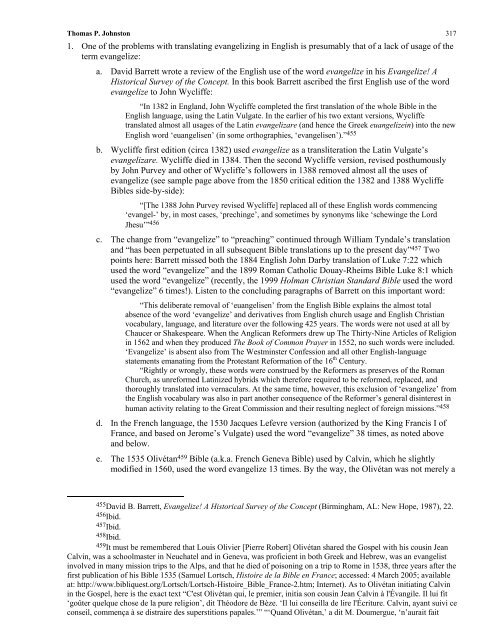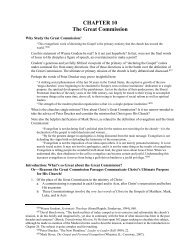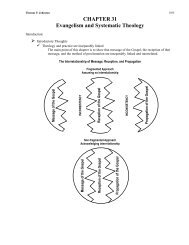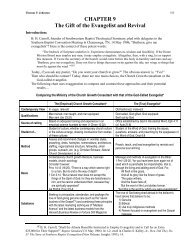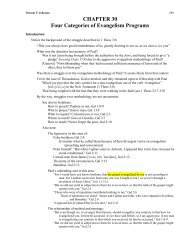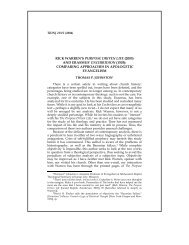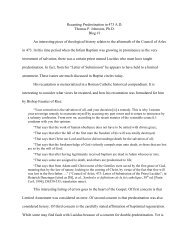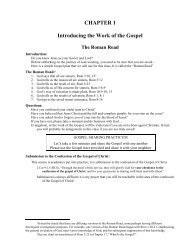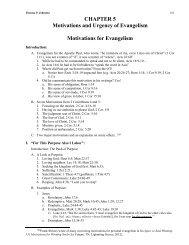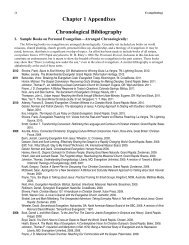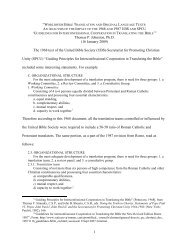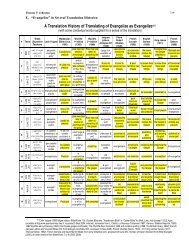CHAPTER 7 Defining Evangelizing - Evangelism Unlimited
CHAPTER 7 Defining Evangelizing - Evangelism Unlimited
CHAPTER 7 Defining Evangelizing - Evangelism Unlimited
You also want an ePaper? Increase the reach of your titles
YUMPU automatically turns print PDFs into web optimized ePapers that Google loves.
Thomas P. Johnston 317<br />
1. One of the problems with translating evangelizing in English is presumably that of a lack of usage of the<br />
term evangelize:<br />
a. David Barrett wrote a review of the English use of the word evangelize in his Evangelize! A<br />
Historical Survey of the Concept. In this book Barrett ascribed the first English use of the word<br />
evangelize to John Wycliffe:<br />
“In 1382 in England, John Wycliffe completed the first translation of the whole Bible in the<br />
English language, using the Latin Vulgate. In the earlier of his two extant versions, Wycliffe<br />
translated almost all usages of the Latin evangelizare (and hence the Greek euangelizein) into the new<br />
English word ‘euangelisen’ (in some orthographies, ‘evangelisen’).” 455<br />
b. Wycliffe first edition (circa 1382) used evangelize as a transliteration the Latin Vulgate’s<br />
evangelizare. Wycliffe died in 1384. Then the second Wycliffe version, revised posthumously<br />
by John Purvey and other of Wycliffe’s followers in 1388 removed almost all the uses of<br />
evangelize (see sample page above from the 1850 critical edition the 1382 and 1388 Wycliffe<br />
Bibles side-by-side):<br />
“[The 1388 John Purvey revised Wycliffe] replaced all of these English words commencing<br />
‘evangel-’ by, in most cases, ‘prechinge’, and sometimes by synonyms like ‘schewinge the Lord<br />
Jhesu’” 456<br />
c. The change from “evangelize” to “preaching” continued through William Tyndale’s translation<br />
and “has been perpetuated in all subsequent Bible translations up to the present day” 457 Two<br />
points here: Barrett missed both the 1884 English John Darby translation of Luke 7:22 which<br />
used the word “evangelize” and the 1899 Roman Catholic Douay-Rheims Bible Luke 8:1 which<br />
used the word “evangelize” (recently, the 1999 Holman Christian Standard Bible used the word<br />
“evangelize” 6 times!). Listen to the concluding paragraphs of Barrett on this important word:<br />
“This deliberate removal of ‘euangelisen’ from the English Bible explains the almost total<br />
absence of the word ‘evangelize’ and derivatives from English church usage and English Christian<br />
vocabulary, language, and literature over the following 425 years. The words were not used at all by<br />
Chaucer or Shakespeare. When the Anglican Reformers drew up The Thirty-Nine Articles of Religion<br />
in 1562 and when they produced The Book of Common Prayer in 1552, no such words were included.<br />
‘Evangelize’ is absent also from The Westminster Confession and all other English-language<br />
statements emanating from the Protestant Reformation of the 16 th Century.<br />
“Rightly or wrongly, these words were construed by the Reformers as preserves of the Roman<br />
Church, as unreformed Latinized hybrids which therefore required to be reformed, replaced, and<br />
thoroughly translated into vernaculars. At the same time, however, this exclusion of ‘evangelize’ from<br />
the English vocabulary was also in part another consequence of the Reformer’s general disinterest in<br />
human activity relating to the Great Commission and their resulting neglect of foreign missions.” 458<br />
d. In the French language, the 1530 Jacques Lefevre version (authorized by the King Francis I of<br />
France, and based on Jerome’s Vulgate) used the word “evangelize” 38 times, as noted above<br />
and below.<br />
e. The 1535 Olivétan459 Bible (a.k.a. French Geneva Bible) used by Calvin, which he slightly<br />
modified in 1560, used the word evangelize 13 times. By the way, the Olivétan was not merely a<br />
455David B. Barrett, Evangelize! A Historical Survey of the Concept (Birmingham, AL: New Hope, 1987), 22.<br />
456Ibid. 457Ibid. 458Ibid. 459It must be remembered that Louis Olivier [Pierre Robert] Olivétan shared the Gospel with his cousin Jean<br />
Calvin, was a schoolmaster in Neuchatel and in Geneva, was proficient in both Greek and Hebrew, was an evangelist<br />
involved in many mission trips to the Alps, and that he died of poisoning on a trip to Rome in 1538, three years after the<br />
first publication of his Bible 1535 (Samuel Lortsch, Histoire de la Bible en France; accessed: 4 March 2005; available<br />
at: http://www.bibliquest.org/Lortsch/Lortsch-Histoire_Bible_France-2.htm; Internet). As to Olivétan initiating Calvin<br />
in the Gospel, here is the exact text “C'est Olivétan qui, le premier, initia son cousin Jean Calvin à l'Évangile. Il lui fit<br />
‘goûter quelque chose de la pure religion’, dit Théodore de Bèze. ‘Il lui conseilla de lire l'Écriture. Calvin, ayant suivi ce<br />
conseil, commença à se distraire des superstitions papales.’” “‘Quand Olivétan,’ a dit M. Doumergue, ‘n’aurait fait


